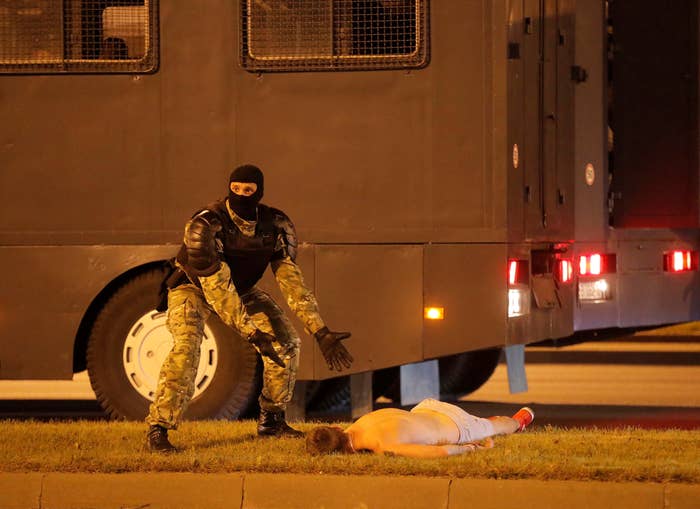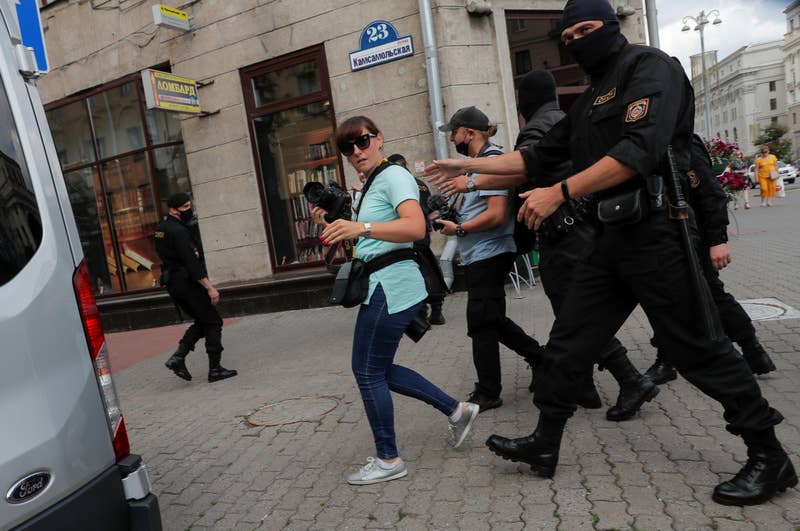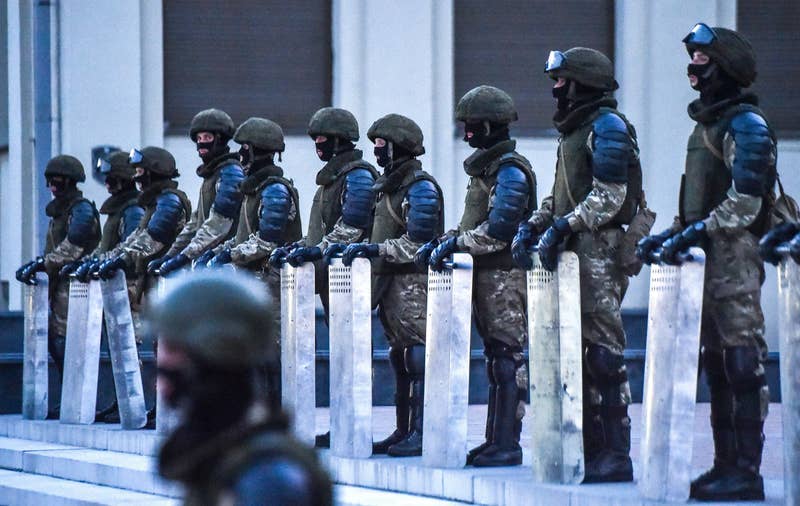A week of protests has followed a rigged election in Belarus, where President Alexander Lukashenko’s security state deployed violence and fear to cling to power.
Dan Peleschuk BuzzFeed Contributor
Reporting From
Kyiv, Ukraine
Posted on August 16, 2020

Vasily Fedosenko / Reuters
A Belarusian law enforcement officer gestures next to an injured protester, Yevgeny Zaichkin, Aug. 9.
KYIV — “Bitch, God forbid you raise your fucking head.”
With those words, the hulking, masked officer slammed the door shut. Around 20 of us knelt in agony on the steel floor of the troop transport vehicle, our faces pressed against the seats, following his orders, as we began trundling to an unknown destination.
The hot August air was thick with sweat and fear. I wondered if I’d see my parents again.
For anyone on the streets of Minsk and other cities around the country, the sound of Alexander Lukashenko’s Belarus has now become the roar of crowds demanding his ouster, fair elections, and a freer country.
But for me, and the thousands of others detained last week, it’s a combat boot striking the side of a human torso. Or the cries of a person buckled in pain.
Judging by the horrendous accounts of police abuse trickling out of Belarus, my experience was far from the worst. But two days in detention was enough to understand what kept Belarusians cowed and submissive for years — and why that’s now changing.
As anger bubbled across this post-Soviet nation of 9.5 million following last Sunday’s clumsily rigged election, which handed the former collective farm boss a sixth term, I was sucked into the dark heart of the brutal security apparatus that’s helped keep him in power since 1994.
Random detentions. Vicious beatings. Psychological abuse. Deployed freely in the days following Lukashenko’s deeply flawed election, these time-tested staples of an autocratic security state may actually mark its undoing.
Eager to watch the election unfold, I’d hoped to secure accreditation before arriving in Minsk last Saturday. Like the vast majority of my fellow foreign correspondents, my request was ignored. But with tickets already in hand, I traveled to Belarus anyway, intent on observing — at a reasonably safe distance, I figured — how events would play out.
I conducted no interviews, published nothing, and stayed mostly off social media. A tourist in a handsomely rebuilt showcase capital, I walked its regal boulevards and spotless sidewalks, watching and waiting for signs of unrest.
It finally came Sunday evening. After preliminary results handed Lukashenko an utterly unbelievable 80% of the vote, Belarusians flooded the streets of central Minsk, leading to clashes in several places between police and protesters, including outside my building. After briefly stepping out to watch the feared riot cops tighten their grip on the central boulevard, I quietly retreated back to my apartment.
The following evening was a nightmare.
By around 7 p.m., an eerie calm had gripped the city, as both residents and authorities anxiously anticipated more turmoil. Strolling toward a park near the previous night’s clashes — with no signs of building protests — I was approached by a group of black-clad riot police, known by their acronym “OMON.”
With balaclavas pulled over their faces, and their bodies covered by layers of fatigues and armor, their steely, violent eyes were the only sign a human resided underneath.
“Where are you going?” demanded one. “Why are your hands in your pockets?” barked another. Several more questions were hurled my way. They weren’t interested in answers; they were fishing for excuses to detain me.
Mere seconds after it emerged that I was an American who’d arrived from recently revolutionary Ukraine — a potential propaganda gift for an autocrat obsessed with alleged foreign meddling — I was manhandled into the windowless prisoner transport vehicle parked nearby.
Within half an hour, six or seven of us filled a space the size of a bathroom stall, our bodies awkwardly contorted around one another.
Driven to the Pervomaisk district police station, we were pulled into the courtyard and lined up facing the wall with our heads down, legs spread, and hands behind our backs, asked for our names and dates of birth. Some of those not standing rigidly enough received a fist to the side, or a kick in the knee.
When my turn came, I calmly stated I was an American citizen. “Who fucking cares,” the officer grunted.

Vasily Fedosenko / Reuters
Law enforcement officers detain journalists, not including the author, who were on assignment in Minsk, Belarus, July 28.
Funneled into the gym, we were stripped of our belongings and cataloged again. Fate failed the young man who had a can of pepper spray: Riot officers beat him to the ground and continued pummeling him as he groaned in agony, shouting, “Why the fuck would you need this?”
His body absorbed the blows like a sandbag bursting at the seams.
Over the next few hours, the crowd inside the gym swelled to several dozen. As riot police returned to the streets, we were ordered by local guards — much less severe, though mostly disinterested in our comfort — to sit on a narrow wooden ledge along the wall, heads down and hands on our knees. I eventually convinced them to let me lie on the floor, since an old back injury left me grimacing in pain.
Later, I was allowed to stay on a wrestling mat on the other side of the gym. That helped police keep track of me as the lone American, perhaps sparing me from the beatings that befell others.
Occasionally, the guards would pass around two liter-sized bottles of water among the detainees. Some requests to visit the bathroom were granted, others ignored. Throughout the night, we were called one-by-one — many bloodied or limping in pain — to complete our arrest sheets. All were charged with the administrative offense of participating in an unsanctioned rally, which carries a maximum sentence of 15 days.
Sometime in the middle of the night, OMON burst into the gymnasium, visibly heated and full of hate from what must have been a night of street fights downtown. In Lukashenko’s police state, they are the tip of the spear — violence-craving, brainwashed goons who equate even the slightest dissent with treason. Their sole purpose is to strike fear into citizens’ hearts.
That night, they called the shots.
They forced us up, then down on our knees, hands behind our backs and heads pressed to the floor. We lay in fear as the officers paced around the room, amid a tirade of expletives and threats, like predators sniffing out their prey. The stomping of their boots reverberated across the hardwood court and echoed throughout the frigid gym, its windows agape as the cool air wafted in.
Again, those deemed not submissive enough were beaten or their heads were kicked into the “proper” position. After several more random assaults, they left, and over the next several hours the tension slightly dispersed as we gradually eased into various forms of semi-fetal positions.
Clutching my knees to my chest as tightly I as could, I shivered into a faint slumber.
Around noon the next day, after being booked and photographed, we were split into two groups. “American, go with them,” the chief officer shouted, pointing to the group assembling by the door and corralled by newly arrived riot police.
With my heart in my stomach, I simply stared at him in denial, pretending not to have understood. During my booking, I was able to sneak in two calls — to my parents in the US and to a journalist in Kyiv — but if I left that gym, my passport confiscated, I fear I’d never be found.
But knowing refusal meant a vicious beating, I complied, broken and meek.
Dragged outside and into an idling troop carrier, we were again forced onto our knees along the aisle, hands behind our backs and heads against the seats. Amid endless streams of profanity, including the dire warning to keep our heads down, another beating or two was meted out to a deeply unlucky detainee.
We pulled away, clueless as to where we were going. The OMON officers taunted us: “Is this the change you wanted?” referring to a Soviet-era rock song, “I Want Changes,” that’s become the anthem of the opposition movement.
As we drove, the young man pressed up against my right side — a bespectacled, seemingly harmless nerd — began gasping for air, then quietly crying in pain. “Hold on,” I whispered repeatedly through the side of my mouth. I told him to focus on breathing deeply, hoping he’d follow my lead.
“I can’t. Dammit, I can’t,” he responded, now practically weeping.
Sitting on my heels, praying the guards wouldn’t notice, I’d lost all feeling in my legs. Bent so far back, my feet felt as if they’d snap off. Between thinking of my parents and trying to picture my friends’ smiling faces, I mused over how a recent heartbreak seemed absurdly trivial. So did COVID-19, which I assumed I’d already contracted.
I just wanted to live, and for someone to find me.

Sergei Gapon / Getty Image
Belarus's law enforcement officers guard government buildings during a protest rally against police violence in central Minsk, Aug. 14.
An hour and a half later, we arrived at a detention facility in Zhodino, about 40 miles outside Minsk. As we idled in the courtyard the psychological torment began: “Welcome to the worst place on Earth,” one officer said, demonstratively chuckling.
Another said ominously, “This is where you’ll learn.”
Led through dark basement corridors reminiscent of a Cold War spy film, the barking of massive dogs and the crackling chatter of walkie-talkies pierced the dank air. “This can’t be real,” I repeated to myself.
After being strip-searched and processed, we were split up further and led toward a cell. When the door swung open, I was stunned: The 10-bed, 150-square-foot cell was already over capacity — and now there were 27 of us in total. Still, the men inside erupted into applause and offered their hands. “Hey, fellow political prisoners!”
The mood lightened, and for the first time, I understood that something had changed.
I scanned my fellow cellmates. Beaten faces and shirts stained orange from day-old blood. Knees split open, oozing from infection. Baton-shaped bruises across backs. Yet except for the youngest among them, who were between 18 and 20 years old, few were visibly afraid.
Over the next day-and-a-half in that musty, oxygen-deprived cell — packed with students, techies, small business owners, and blue-collar workers — inmates traded stories about how their arrest sheets had been fabricated to claim they’d been shouting slogans or inciting protests. Most had been picked off the street like me; some right front of their homes.
Angry but not radical, they referred to cops in street slang meaning “trash.” But they also waxed poetic about being fed up with economic stagnation and being treated like cattle.
Vasya, a middle-aged man who owns an auto parts store, complained of the inordinate level of taxes he pays, which finances the security apparatus that snatched him from a bus stop. For Artyom, a wispy-haired programmer resembling Rasputin, and who was serving a 10-day sentence for participating in an earlier protest, the experience was a turning point: “I’m no longer afraid,” he said. “After this, what’s left to fear?”
In short, not a single man believed the Lukashenko regime had any legitimacy left.
We cracked jokes, sang songs, celebrated the rare and sacred deliveries of bread and prison gruel. When things got too quiet, the more jovial among us would yell, “Long live Belarus!” — a long-favored chant of the opposition — which would solicit the bellowing response, “Live on!”
Human decency ruled: Whenever one man realized he’d spent a couple hours in bed, he’d offer his space to another sprawled across the cold floor or hunched over the crooked communal table. If someone hadn’t eaten, he’d be implored to do so. Today, these men are my heroes; facing the unknown, their priority was to maintain our collective spirit.
But mostly, we waited. Legally, a judge in Belarus has 72 hours to try a case before the suspect is released from detention. Those of us who hadn’t been sentenced gamed out various scenarios: What if time runs out? Will we be freed? With a broken pen and tiny scraps of paper snuck in, they traded relatives’ contact information.
At one point, a guard summoned three of our youngest cellmates and told them they were headed home. Shortly after, one of them returned saying he was told he’d receive a 15-day sentence in the morning. That sparked jeers. “So that’s how you sent him home, you fucker?” yelled one of my cellmates.
Through a crack in our door, we could see and hear the constant stream of new prisoners overwhelming a system not designed for such mass detentions. The unnerving clank of prison doors never seemed to cease. Communicating with our neighbors by banging on the wall and yelling through the window, we tried to feel out the situation by finding out how many had been sentenced.

Sergei Gapon / Getty Images
People detained during recent rallies of opposition supporters leave the Okrestina prison early morning in Minsk, Aug. 14.
Around midnight on the third day of my detention, a guard barged in.
“Peleschuk!” he shouted. “Where is he?” I slid off my cot and sauntered to the door, nodding to my cellmates — who had begged me to “tell the world” about everything I’d seen — as they wished me luck. I had no idea where I was going.
Led through several corridors crammed with prisoners’ belongings, I was shocked at the disarray: Hundreds of individual black plastic bags strewn across the floor, many torn open. Belts, phones, wallets, shoelaces scattered everywhere. Guards, meanwhile, darted back and forth, barely managing the influx of prisoners.
For all its terror, I realized Lukashenko’s fearsome police state is simply another part of the country’s bloated bureaucracy: mired in paperwork and run by hacks loyal only to a state paycheck.
Except, of course, for OMON: As long as these brutal punishers are patrolling the streets with state support, Belarusians will never truly be safe.
Eventually, I was led to a portly administrator who claimed I was being released with a warning, and that representative from the US Embassy had arrived to pick me up. I did not believe him; one of my greatest fears throughout my detention was becoming a political pawn, my face splashed across state media as an “agent provocateur” sent to stir unrest.
It wasn’t until I was led through the prison courtyard and into the administrative wing near the entrance that I exhaled. When I saw the consular officer sitting inside a small office, I knew I was free.
The next day, I picked up my passport from the police precinct (which required more wheel-greasing by the embassy) and booked a flight back to my base in Kyiv.
During my drive to the airport, I watched thousands of cheerful protesters line the city’s main boulevard, led by women in white clothing and accessories, such as flowers and flags. A direct contrast to the evils that mark Lukashenko’s police state, those are the faces now filling streets across the country in what amounts to the single biggest challenge to Belarusian authorities since the collapse of the Soviet Union.
Now safe in Kyiv, I have not yet unpacked my suitcase. I want the smell of prison to linger, to help me remember the much better men left behind, with no embassy to rescue them.
As I was writing this account, a friend from Minsk wrote me a birthday greeting. “Just like in a game of survival,” she said, “you’ve been born again.”
Judging the momentum building by the day against Lukashenko, the same just might be true for the Belarusian people.
Belarus Is Detaining Thousands Of Peaceful Protesters. Many Are Telling Gruesome Stories Of Physical And Psychological Abuse By Police.
Christopher Miller · Aug. 14, 2020
Christopher Miller · Aug. 13, 2020
Christopher Miller · Aug. 11, 2020

Dan Peleschuk is a Kyiv-based freelance writer and editor who has covered the former Soviet Union for more than a decade.

Dan Peleschuk is a Kyiv-based freelance writer and editor who has covered the former Soviet Union for more than a decade.
No comments:
Post a Comment